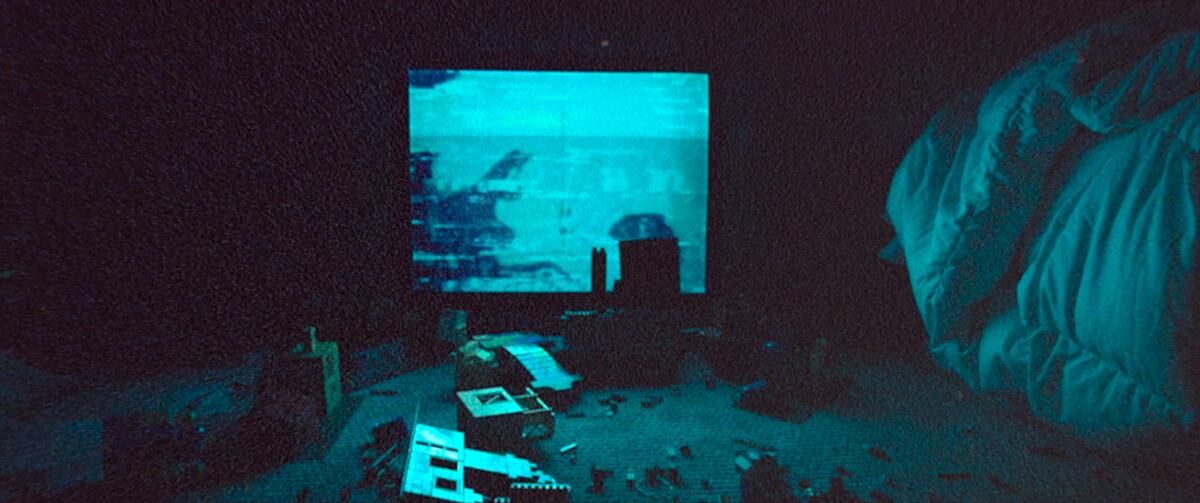Review: ‘Skinamarink’ takes viewers on a dark, disturbing journey to the edge of oblivion

Spend enough time on YouTube and eventually the algorithm will cough up something that looks like a point-of-view shot of a nightmare — at once frustratingly mundane and compellingly inexplicable. These videos are all over the site, and typically feature creepily realistic digital images of an endlessly winding parking garage or a labyrinthine office corridor. Sometimes the ground is covered in pools of water. Sometimes a monster leaps from the shadows. And sometimes these hallways, basements and sub-basements just keep going, leading the viewer into a strange, liminal oblivion.
If you find those kinds of videos captivating and/or disturbing, you’re likely to love “Skinamarink.” Since its short run on the festival circuit last year, writer-director Kyle Edward Ball’s odd experiment in cinematic immersion has become a word-of-mouth sensation among horror connoisseurs — though it’s the kind of movie destined to baffle and irritate as many people as it beguiles.
For your safety
The Times is committed to reviewing theatrical film releases during the COVID-19 pandemic. Because moviegoing carries risks during this time, we remind readers to follow health and safety guidelines as outlined by the CDC and local health officials.
Reportedly shot for $15,000 — with digital cameras that Ball, cinematographer Jamie McRae and their post-production crew have tweaked to make the picture look like extremely grainy celluloid — “Skinamarink” has no plot per se. Instead, the film drops the viewer into the middle of a disorienting middle-of-the-night exploration of a darkened house, shot at odd angles. Through all the low-lit images and barely audible whispers, gradually we realize we’re seeing the world through the perspective of two preschool-age children, who have awakened to find that all the adults are gone, all the technology in their home is on the fritz and all their potential exits have disappeared.
Ball never gives the audience much more to work with than that. The dialogue is so quiet that sometimes Ball relies on subtitles to convey whatever information he feels is essential. The rest of the soundtrack is made up of ambient noise and clips of public domain cartoons on television; and even those sounds from the TV often devolve into static or get stuck on repetitive loops. Meanwhile, the POV remains so cockeyed that with each new shot, it can take the viewer a few seconds (or longer) to figure out not just what’s on the screen but whether it’s being shown right side up, upside down or sideways. Occasionally — but less often than he could — Ball takes advantage of the confusion to toss in a jump-scare.
One of the reasons why “Skinamarink” has been so buzzed-about is that it was pirated and shared on the internet late last year — which is ironic, because this is one of the rare modern movies that demands to be seen in a theater, where the darkness and stillness can help it cast its spell. (When the film does arrive at its future home on Shudder later this year, try to watch it with zero distractions.) There is always a danger too that when a horror picture gets this much hype, people will arrive unprepared for how unusual the experience will be.
So be warned: “Skinamarink” is atypical in nearly every way. It’s not flawless. A lot of what Ball is doing here might’ve been more effective within a shorter running time; and more narrative clarity likely wouldn’t have killed the overall vibe. But the chances Ball takes pay off in a one-of-a-kind film that re-creates the sensation of being very young and essentially powerless, unable even to articulate why everything feels so … wrong.
'Skinamarink'
Not rated
Running time: 1 hour, 40 minutes
Playing: Starts Jan. 13 in general release
More to Read
Only good movies
Get the Indie Focus newsletter, Mark Olsen's weekly guide to the world of cinema.
You may occasionally receive promotional content from the Los Angeles Times.










